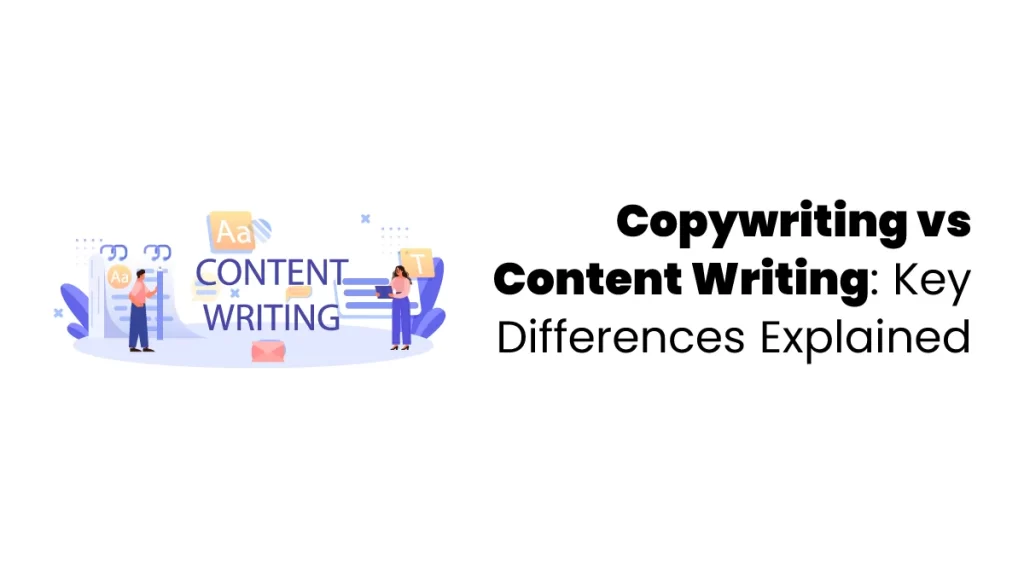Copywriting is often mistaken for being the same as content writing, but they are not identical. In fact, the debate around copywriting vs content writing is common among businesses and marketers. Sometimes, content writers have to generate persuasive copy or scripts that attract people’s attention for brands. This means they have to act like copywriters. Both jobs are still different, though, with different goals and writing styles. In this article, we’ll look at the variations between copywriting and content writing. This will help you understand the purpose and value of each.
Understanding Copywriting and Content Writing
Copywriting and content writing are two very different skill sets, but both are essential for a successful marketing strategy.
Copywriters specialise in producing content that persuades audiences to take an action, be it buying something online or signing up for email lists. Their job is to convert casual visitors to paying customers using compelling language in places like websites, ads, emails and billboards. Rather than providing information solely, copywriting works closely with marketing departments by encouraging click-through rates through call-to-action buttons (CTA) and caller ID systems (ID).
A copywriter might work on:
- Social media captions and ad copy
- Marketing emails and sales letters
- Landing pages and website content
- Product descriptions and brochures
- Commercials, radio ads, and billboards
Content writers specialise in crafting useful and entertaining written pieces that engage and inform audiences. They create blogs, eBooks, guides and articles which discuss specific subjects extensively. Many also share blog post writing tips, such as using catchy headlines and keeping paragraphs short, to make content easier to read. Content writing aims to inform, entertain and educate its target audience – helping them learn something new or overcome an obstacle they encounter both personally and professionally.
Content writers may work on:
- Blog posts and articles
- E-books and detailed guides
- Case studies and whitepapers
- User manuals or product documentation
- Social media posts, press releases, and video scripts
Like content writing, copywriting is also widely used across multiple industries, but when we look at copywriting vs content writing, copywriting has a stronger focus on driving sales, creating engagement, and encouraging immediate action from the audience.
Similar Goals of Content Writing and Copywriting
Think of content writing and copywriting as two sides of the same coin — different roles, but with shared foundations:
- Audience Connection: Both are meant to grab people’s attention and keep them interested.
- Brand Goals: Each one helps the brand expand by bringing in new customers, traffic, and sales.
- Creative Approach: Writers employ their imaginations to match the brand’s tone and message.
- Action-oriented: CTAs tell readers what to do next, including clicking, buying, or signing up.
- Research-Based: Both depend on strong research and good storytelling to give content significance.
Difference Between Copywriting and Content Writing
While both copywriting and content writing involve creating engaging material to engage audiences, their approaches, intentions, and outcomes differ significantly.
| Aspect | Content Writing | Copywriting |
| Purpose | Educates & builds trust | Persuades & sells |
| Emotions | Explains & informs | Creates urgency |
| Length | Long-form | Short-form |
| SEO | High focus | Low focus |
| Goal | Drive traffic & awareness | Convert leads |
Let’s explore how they differ.
Objective Behind the Writing
Content writing serves to both educate and inform. It offers readers detailed explanations, practical insights and answers to any queries. Content writers usually produce longer pieces that step readers stepwise through topics to increase understanding while building trust between themselves and a brand.
Copywriting, however, focuses on prompting action from its readers. Copywriters use short but persuasive pieces of writing that convince people to subscribe or purchase. Their writing should capture attention quickly while leading readers toward taking immediate steps, which usually include subscribing, signing up or buying immediately after reading it.
Key Targets
While both types of writing aim to support brand growth, their goals vary. Content writing aims to build credibility and authority over time by offering valuable knowledge that educates audiences while engaging them long-term.
Copywriting, on the other hand, aims for immediate conversions: every word chosen influences readers instantly to take immediate actions that generate immediate responses measurable responses measurable responses while content writing establishes relationships slowly, while copywriting brings results immediately.
Emotional Impact
Copywriting and content writing must both resonate with an audience in unique ways, with content writers using logic, clarity, and meticulous explanations to connect intellectually with readers while copywriters focus on making readers aware of processes while underlining expertise – leaving readers informed yet assured.
Copywriters use emotion and persuasion to motivate readers into action, often through tactics such as Fear of Missing Out (FOMO), urgency, or strong calls-to-action that motivate readers into taking immediate steps toward conversion rather than education. Here, emotions play an instrumental role in driving conversions rather than simply providing informational value.
SEO Importance
Search engine optimisation (SEO) is an integral aspect of content writing, where writers incorporate keywords, search intent and structured text into articles to rank well on search engines and draw organic traffic to articles written about specific subjects or guides written for any given audience. SEO allows brands to reach wider audiences while offering useful knowledge. Many experts also share content writing tips for better SEO, such as writing clear meta descriptions, using proper headings, and keeping the content easy to read, to maximise visibility and engagement.
In the discussion of copywriting vs content writing, SEO plays a secondary role in copywriting. Website content, such as website pages or product descriptions, should prioritise persuasive language over keywords; rather than targeting search engine spiders with content optimised solely to rank highly for search engines. A specialised area called SEO copywriting brings these two aspects together by creating conversion-focused copy that balances optimisation with persuasive appeal for its readership.

Content Formats
Content writing and copywriting each produce varied forms of written material to suit their goals and audiences.
Content Writing Includes: Blogs, articles, e-books, newsletters, guides, case studies, reviews, press releases and podcasts provide opportunities to delve into topics in more depth while engaging audiences for prolonged engagement.
Copywriting Includes: Landing pages, email campaigns, ad copy, video scripts, web content, CTAs and chatbot messages – these short, powerful pieces designed to generate instantaneous action are often more effective at encouraging conversion.
Essential Skills for Content Writing and Copywriting
Content writing and copywriting both require special talents to create effective and engaging material for readers. The key skills are shown below:
Copywriter Skills
- Write a short, convincing text that leads readers to take action.
- Focus on clients who are in the decision-making stage of the marketing funnel.
- Make headlines that capture people’s attention (preferably fewer than 12 words) and fit with the page.
- To get people to take action, use CTAs and persuasive wording.
- It’s good to know some basic SEO, but it’s not necessary. The main thing is to get people to participate, not to rank.
Content Writer Skills
- Focus on educating and informing readers rather than direct selling.
- Blend storytelling, branding, and SEO in all content.
- Understand search intent:
- Informational – readers seek knowledge
- Transactional – readers want to buy or act
- Navigational – readers look for a specific site or business
- Perform keyword research using tools like Semrush, Ahrefs, or Moz.
- Ensure content is unique and plagiarism-free to maintain quality and credibility.
Copywriting vs. Content Writing: Which Fits Your Business?
The right choice between copywriting and content writing ultimately depends on your business goals and desired results. Understanding the difference between copywriting and content writing helps you decide which approach works best for building brand awareness, driving engagement, or boosting conversions.
Content Writing
- Best for plans that will last a long time.
- Concentrates on teaching and involving your audience with thorough, useful material.
- Long-form essays, blogs, and guides show off your knowledge and make you more trustworthy over time.
- Great for companies that want to become leaders in their field and build a devoted following.
Copywriting
- Made for things that need results quickly and don’t last long.
- It makes people want to do things like buy something, sign up, or subscribe.
- Works best in ads, landing pages, and other messages that need to urge users to buy right away.
- Good for businesses that want to get people to buy products right away.
Bottom Line
- Writing content is a great way to teach people and make friends for life.
- Use copywriting to get people to act swiftly and get them to do what you want.
- Many successful firms use both strategies: they use content to build trust and copy to get people to take action.
Conclusion
Copywriters and content writers possess many similar skills; however, their roles and approaches vary considerably. While copywriters specialise in crafting short, engaging messages designed to capture attention quickly and prompt immediate action – like clicking a button, filling out an online form, or making a purchase – content writers use longer SEO-driven pieces designed to inform audiences, foster trust within audiences, build customer loyalty over time, and turn newcomers into lifelong customers.
Hiring professionals who excel in both areas can make for excellent hires; when making this selection, it is critical that their strengths align with those required – for instance, conversion-focused copywriting and long-form content production as examples – before making your final selection decision. Just as enrolling in a course on digital marketing in Bangalore helps you develop the right strategies to grow your business, choosing the right writer ensures your message is delivered effectively and connects with the right audience.
FAQs
- Which is better: content writing or copywriting?
Content writing aims at teaching, informing, and building trust among readers; copywriting drives fast action from readers. Both types of writing play an essential part in marketing; the best choice depends on whether long-term relationship building (content writing) or immediate results are desired (copywriting).
- Can a copywriter also be a content writer?
Yes, people can write both forms of content, but knowing the distinctions is crucial. Applying copywriting techniques will increase readership while making content writing more captivating and impactful.
- Who earns more: copywriters or content writers?
Copywriters typically earn higher pay because their work directly influences sales and conversion rates for businesses; businesses will usually pay an upcharge for copy that attracts new customers, while content writing serves to educate and grow an audience over time.
- Is copywriting longer than content writing?
No. While copywriting typically refers to short, succinct pieces -like advertising headlines, product descriptions, or calls to action, content writing typically encompasses longer pieces that cover topics in depth, such as blogs or guides.
- Which is easier: content writing or copywriting?
Consider what type of writing best suits your writing style: copywriting can be great if it elicits emotional responses; for more research-driven approaches, such as content creation, it might feel more natural to you.










